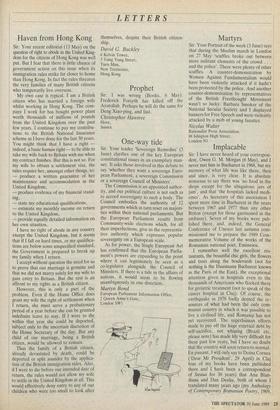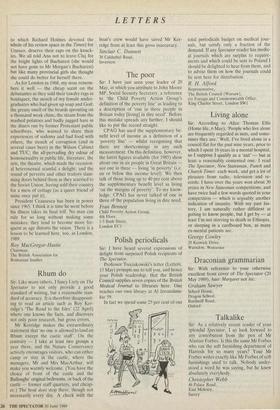Implacable
Sir: I have never heard of your correspon- dent, Owen G. M. Morgan (6 May), and I never met him in Bucharest in 1968, but my memory of what life was like there, then and since, is very clear. It is absolute nonsense to say there was `no food in the shops except for the ubiquitous jars of jam', and that 'the hospitals lacked medi- cines'. As Secretary of this association I spent more time in Bucharest in the years between 1967 and 1977 than any other Briton (except for those garrisoned in the embassy). Seven of my books were pub- lished there, and, indeed, the General Conference of Unesco last autumn com- missioned me to prepare the 1989 Com- memorative Volume of the works of the Romanian national poet, Eminescu.
I remember well the excellent res- taurants, the beautiful chic girls, the flowers and trees along the boulevards (not for nothing is the Hausmann Bucharest known as the Paris of the East), the exceptional attention given in hospitals even to the thousands of Americans who flocked there for geriatric treatment (not to speak of the cancer hospital in Cluj).- Of .course, the earthquake in 1976 badly dented' the re- sources of what had- been the only com- munist country in which it was possible to live a civilised life, and Romania 'has not yet recovered. The superhUman efforts made to pay off the huge external debt by self-sacrifice, not whining (Brazil etc, please note) has made life very difficult for these past few years, but I have no doubt that the country. will soon return to normal. En passant, I Will Only say to Doina Cornea (Dear Mr President', 29 April) in Cluj four of my . books have been published there and I haVe been a correspondent of Steaua for 30 years) that Ana Blan- diana and Dan Desliu, both of whom I translated many ye'ars ago (ply Anthology of Contempbrary Romanian Poetry, 1969,
LETTERS
to which Richard Holmes devoted the whole of his review space in the Times) for Unesco, deserve their raps on the knuck- les. We all told Ana not to leave Cluj for the bright lights of Bucharest (she would not have gone to Mr Morgan's Bucharest) but like many provincial girls she thought she could do better for herself there.
As for London in 1968, my nose remem- bers it well — the cheap scent on the debutantes as they sold their tawdry rags in boutiques; the stench of my female under- graduates who had given up soap and God; the greasy smell of the beards sprouting on a thousand weak chins; the steam from the mashed potatoes and badly jugged hare in the diners run by former Protestant public schoolboys, who wanted to share their experiences of sodomy and bad food with others; the stench of corruption (and in several cases beer) in the Wilson Cabinet and TUC; the all-pervading dry odour of homosexuality in public life, literature, the arts, the theatre, which made the occasion- al heterosexual scandal a delight; and the sound of perverts and other traitors slam- ming doors behind them as they scurried to the Soviet Union, having sold their country for a mess of cottage (as a queer friend of mine once put it).
President Ceausescu has been in power since 1965. I think it is time he went before his illness takes its final toll. No man can rule for so long without making some mistakes; they tend to become more fre- quent as age distorts the vision. There is a lesson to be learned here, too, in London, 1989.
Roy MacGregor-Hastie
Chairman, The British Association for Romanian Studies



























































 Previous page
Previous page